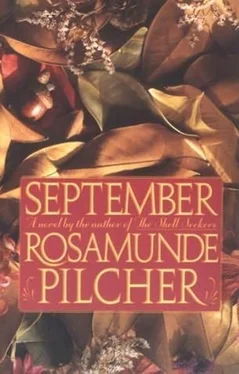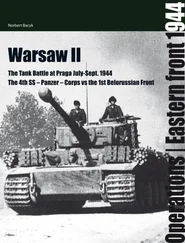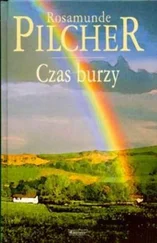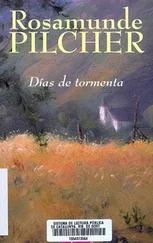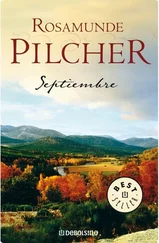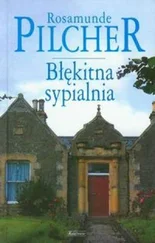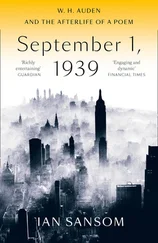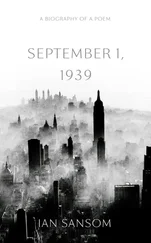Rosamunde Pilcher - September
Здесь есть возможность читать онлайн «Rosamunde Pilcher - September» весь текст электронной книги совершенно бесплатно (целиком полную версию без сокращений). В некоторых случаях можно слушать аудио, скачать через торрент в формате fb2 и присутствует краткое содержание. Жанр: Современная проза, на английском языке. Описание произведения, (предисловие) а так же отзывы посетителей доступны на портале библиотеки ЛибКат.
- Название:September
- Автор:
- Жанр:
- Год:неизвестен
- ISBN:нет данных
- Рейтинг книги:5 / 5. Голосов: 1
-
Избранное:Добавить в избранное
- Отзывы:
-
Ваша оценка:
- 100
- 1
- 2
- 3
- 4
- 5
September: краткое содержание, описание и аннотация
Предлагаем к чтению аннотацию, описание, краткое содержание или предисловие (зависит от того, что написал сам автор книги «September»). Если вы не нашли необходимую информацию о книге — напишите в комментариях, мы постараемся отыскать её.
September — читать онлайн бесплатно полную книгу (весь текст) целиком
Ниже представлен текст книги, разбитый по страницам. Система сохранения места последней прочитанной страницы, позволяет с удобством читать онлайн бесплатно книгу «September», без необходимости каждый раз заново искать на чём Вы остановились. Поставьте закладку, и сможете в любой момент перейти на страницу, на которой закончили чтение.
Интервал:
Закладка:
"Right. I'd like to take it with me if I can."
They moved at a leisurely pace out of the dining-room and into the hall. This was even larger, panelled in pine with a massive staircase, heavily balustraded, rising in three short flights to the upstairs landing. Various items of undistinguished furniture stood about. A carved oak chest, a gate-leg table, and a chaise longue that had seen better days. This was quite often occupied by dogs, but at the moment was empty.
"I shall not come and look for Forestry Commission documents," Violet announced. "I shall sit here until you have found them." And she settled herself majestically on the dogs' bed to wait.
They left her. "We shan't be a moment." She watched them go down the wide passage that led to the library and on to the drawing-room, and on again through glassed doors to the soaring conservatory.
Alone, Violet savoured her momentary solitude, with the old house around her. She knew it so well, had known it all her life. Its every mood was comfortably familiar. Every creak of the stair, every evocative smell. The hall was draughty, but the draughts did not bother her. No longer Violet's home, but Virginia's. And yet it felt much the same as it ever had, as though, over the years, it had assumed a strength of character all its own. Perhaps because so much had happened here. Because it had been the haven and the touchstone of a single family.
Not that Balnaid was a very old house. In fact, it was younger than Violet by a few years, and built by her father, then Sir Hector Akenside, and a man of considerable means. She always thought that Balnaid was a little like Sir Hector. Large, kindly, and lavish, and yet totally unassuming. At a time when men of newly acquired wealth were constructing for themselves huge monuments to their pride of startling hideousness, castellated and turreted, Sir Hector had concentrated his able mind on less glamorous but infinitely more important features.
Central heating, efficient plumbing, plenty of bathrooms, and kitchens filled with sunlight, so that servants (and there were plenty of them) would work in pleasant surroundings. And from the day it was finally completed, Balnaid never looked out of place. Built from local stone on the south side of the Croy, with its back to the village and the river, the face of the house smiled out over a view both domestic and magnificent.
The garden was large, rich with shrubs and mature trees. Sir Hector's passion, he had planned and landscaped it himself, so that formal lawns flowed into drifts of unmown grass, daffodils, and bluebells. Azaleas, coral and yellow, grew in fragrant masses, and mown paths twisted away invitingly out of sight between tall stands of pink- and scarlet-blossomed rhododendrons.
Beyond the garden, and separated from it by a steep ha-ha wall, was an acre or so of parkland, grazing for the hill ponies; and, beyond again, the stone-dyked fields of the neighbouring sheep farmer. Then, in the distance, the hills. They swelled to meet the sky, dramatic as a stage-drop. Constant, and yet continually changing, as the seasons and the light changed: snow-clad, purple with heather, green with spring bracken, swept by gales… whatever. They were always beautiful.
Had always been beautiful.
Violet knew all this because Balnaid had been her childhood home, and so her world. She had grown up within these walls, played solitary games in that magic garden, guddled for trout in the river, ridden her stubby Shetland pony through the village and up onto the lonely hills of Croy. At the age of twenty-two, she had been married from Balnaid.
She remembered driving the little distance to the Episcopalian church in the back of her father's stately Rolls-Royce, with Sir Hector, top-hatted, beside her. The Rolls had been decked out for the occasion with white silk ribbons. These somehow lessened its dignity, and it looked almost as incongruous as Violet felt, with her ample frame laced into a cream satin dress of quite hideous uncom-fortableness and a mist of inherited Limerick lace veiling her homely features. She remembered returning to Balnaid in the same opulent vehicle, but on that journey even the agonizing tightness of her stays had ceased to matter, because she was, at long last, the triumphant wife of Geordie Aird.
She had lived at Balnaid, on and off, ever since, and had not finally moved out until ten years ago, when Edmund married Virginia. He brought Virginia back to Balnaid to live, and Violet knew then that the time had come for her to bow out and allow the old place to welcome its new young mistress. She made the property over to Edmund and bought a gardener's derelict cottage from Archie Bal-merino. This house was called Pennyburn, and there, within the estate walls of Croy, she made a new home for herself. The restoration and refurbishment of the little house had kept her happy for a year, and she was still not finished with the garden.
I am, she told herself, a fortunate woman.
Sitting there, on the dog-smelling chaise longue, Violet looked about her. Saw the worn Turkey rug, the old bits of furniture that she had known all her life. It was pleasant when things did not change too much. When she said goodbye to Balnaid, Violet had never imagined that so little would change. Edmund's new wife, she decided, would be the new broom, come to sweep away all the dusty old traditions, and she was indeed quite interested to see what Virginia-as young and vital as a breath of fresh air-would achieve. But, apart from completely revamping the big bedroom, freshening up the drawing-room with a lick of paint, and turning an old pantry into a utility room that fairly hummed with deep-freezes, washing machines, drying machines, and attendant luxuries, Virginia did nothing. Violet accepted this, but found it puzzling. There was, after all, no lack of money, and to her it seemed strange that Virginia should be content to live with the worn rugs and the faded velvet curtains and the old Edwardian wallpapers.
Perhaps it had something to do with the arrival of Henry. Because after Henry was born, Virginia abandoned all other interests and immersed herself in her baby son. This was very nice, but came as something of a shock to Violet. She had no idea that her daughter-in-law would prove so deeply maternal. With Edmund away so much, and mother and child left on their own, Violet had secret reservations about this overwhelming devotion, and it was a constant source of astonishment to her that despite his upbringing, Henry had grown into such a delightful little boy. A bit too dependent on his mother, perhaps, but still, not spoiled, and a charming child. Perhaps…
"Sorry, Vi, to keep you waiting."
Surprise made her start. She turned and saw Archie and Virginia coming towards her, Archie holding up the long buff envelope as though it were a hard-won banner. "… took a bit of searching for. Come along now, and I'll drive you home."
3
Henry Aird, eight years old, banged with some importance at Edie Findhorn's front door, using her brass knocker shaped like a pixie. The house was one of a line of single-storey cottages that lined the main street of Strathcroy, but Edie's was nicer than anybody else's because it had a mossy thatched roof and forget-me-nots grew in the little strip of earth between the pavement and the wall. Standing there, he heard her footsteps; she unsnibbed the door and threw it open.
"Well, here you are, turned up like a bad penny."
She was always laughing. He loved her, and when people asked him who his best friends were, Edie came on top of the list. She was not only jolly, but fat, white-haired, and rosy-cheeked, and appetizing as a fresh and floury scone.
"Did you have a good day?"
She always asked this, despite the fact that she saw him every lunch-time, because she was the school dinner-lady and served out the midday meal. It was handy having Edie doing this because it meant that she stinted on helpings of things he hated, like curried mince and stodgy custard, and was lavish with the mashed potatoes and chocolate shape.
Читать дальшеИнтервал:
Закладка:
Похожие книги на «September»
Представляем Вашему вниманию похожие книги на «September» списком для выбора. Мы отобрали схожую по названию и смыслу литературу в надежде предоставить читателям больше вариантов отыскать новые, интересные, ещё непрочитанные произведения.
Обсуждение, отзывы о книге «September» и просто собственные мнения читателей. Оставьте ваши комментарии, напишите, что Вы думаете о произведении, его смысле или главных героях. Укажите что конкретно понравилось, а что нет, и почему Вы так считаете.
